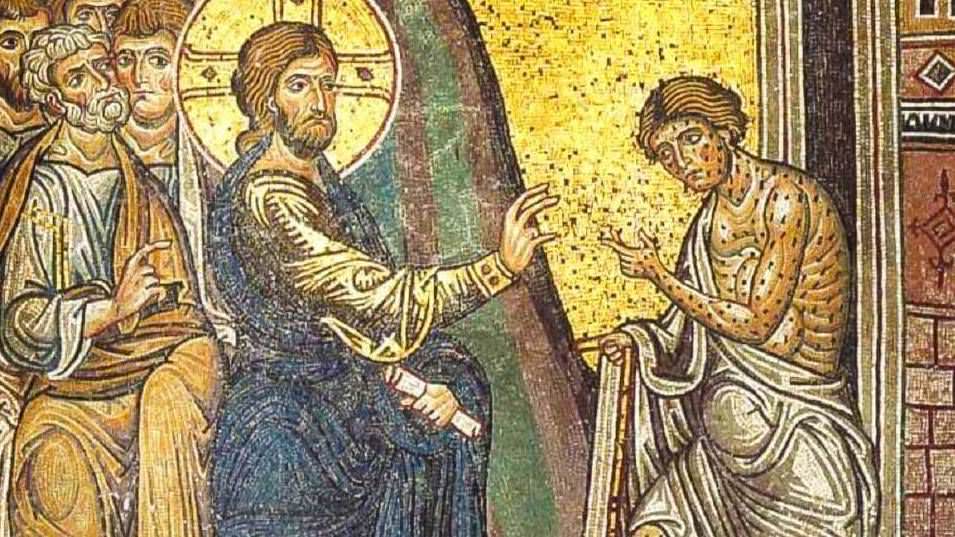In All Things Give Thanks
28th Sunday of Ordinary Time (Year C)

Naaman was the general of King of Aram’s army, and he was good at his job, winning many victories for his king. For this he was highly esteemed, but Naaman had a problem. He had contracted leprosy, the degenerative disease that resulted not only in physical malady, but also in ostracization from society. Leprosy had no known cure in ancient times, but people knew it was contracted through proximity. To keep the dreaded disease from spreading, therefore, lepers were kept isolated from society — something that those of us who have lived through the COVID-19 pandemic can relate to.
But there was a ray of hope for Naaman. His wife had a maidservant who had been captured during a raid on Israel. This Hebrew girl mentioned that the prophet in Samaria (referring to Elisha) would be able to cure him. Naaman was desperate for some solution and so travelled to Israel. There Elisha told him to bathe seven times in the Jordan River and his leprosy would be removed (see 2 Kgs 5:10).
Naaman was disappointed. He had expected the prophet to pray over him, invoking the Hebrew God, laying his hands on the sores, perhaps reciting some magical incantations. He was expecting some sacred ritual to be performed that would justify his long travel. But to just bathe in a river? They had rivers back home. Did he come all this way for nothing?
Nevertheless, Naaman gave it a try. What did he have to lose? He bathed seven times in the Jordan and indeed was healed, just as Elisha had prophesied. This is where our first reading from this Sunday picks up (2 Kgs 5:14-17). Upon discovering that he has been healed, Naaman is filled with such gratitude that he returns to Elisha and offers to give him a gift, having traveled from Aram with a large sum of money. Elisha refuses, so Naaman instead shows his gratitude by worshiping only the God of Israel from that moment forward.
Attitude of Gratitude
In this Sunday’s gospel Jesus cures ten men of their leprosy but only one of them — a Samaritan — returns to give thanks (Lk 17-11-19). Jesus tells this Samaritan, “Your faith has saved you.” In both the gospel and in our Old Testament reading this week, it is a non-Israelite who receives God’s blessing with gratitude.
God bestows blessings upon each one of us; not just a special few. It doesn’t matter whether we are Gentile or Jew, Christian or non-Christian, believer or atheist. It doesn’t matter whether we are rich or poor, black or white, male or female. Regardless of whether we are righteous or unrighteous, the scriptures say that God makes the sun shine and the rain fall on the bad and good alike (Mt 5:45). We have all been blessed by God; more than any of us realize. The fact that we exist at all is a greater gift than anyone can deserve. God has given us the very air that we breathe, the blood that pumps through our veins, and a new day in which to begin again. The question is not whether God has blessed us; the question is how do we receive his blessings.
Do we ignore them? Take them for granted? Resent them? Reject them? Or do we accept them with a thankful heart? Both Naaman and the Samaritan leper accepted God’s blessing with gratitude. So did Jesus.
A Eucharistic People
At the Last Supper, Jesus took bread, gave thanks, and broke it, saying, “This is my body which is given up for you” (cf. Lk 22:19, 1 Cor 11:24). The name we give to the sacrament Jesus instituted at that moment is Eucharist, a Greek word that means “thanksgiving.” It’s important to note that this was on the eve of the agony in the garden, Jesus’ arrest and trial, his passion and death on the cross. Knowing that all of this was to come, Jesus gave thanks to God the Father.
How could Jesus stand at the precipice of such hardship and still manage to have a thankful heart? It’s because he knew better than anyone the truth expressed by St. Paul in Romans 8:28, that “God works all things for the good of those who love him.” St. Paul himself was happy to suffer for the gospel, knowing that everything that happened to him — his imprisonment, his poverty, his infirmities, and even being shipwrecked! — was something God was able, in his divine providence, to work for good and for the salvation of souls. This faith enabled St. Paul to give thanks in all circumstances of his life. Catholics are a Eucharistic people, referring both to our sacramental communion with Christ and our ability to offer thanks to God in all things. One feeds into the other.
Even the secular world affirms that being grateful is good for us. Recent psychological research finds that “gratitude is strongly and consistently associated with greater happiness.” According to a 2021 report from the Harvard Medical School, “Gratitude helps people feel more positive emotions, relish good experiences, improve their health, deal with adversity, and build strong relationships” (source).
So if you are looking for a quick and easy way to both boost your spiritual life and improve your mental health, why not find five things each day to be thankful for? It’s easier than you think, once you take the time to stop and appreciate God’s blessings in all their forms. Let’s all strive to live by the words of holy scripture: “In all circumstances, give thanks, for this is the will of God for you in Christ Jesus” (1 Thes 5:18).

